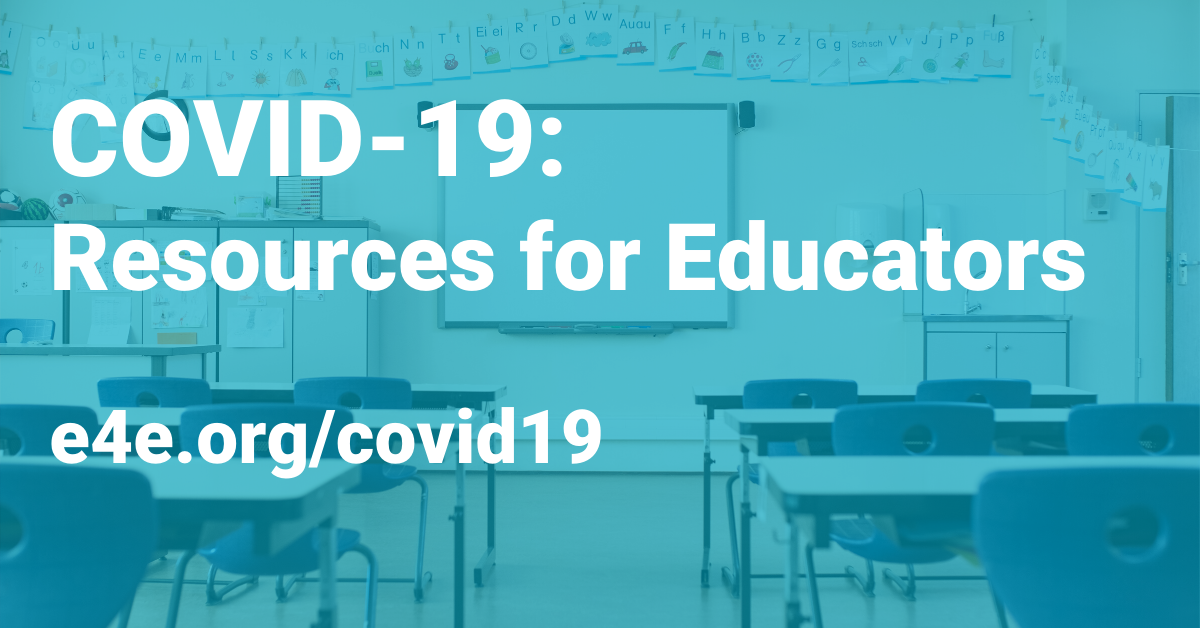March 16, 2020
COVID-19: Resources for Educators

During this time of uncertainty and fear around COVID-19, we know you are concerned for your family, your students, their families, and our greater community. All of us at E4E are, too.
Along with presenting unprecedented challenges for educators, students, and families, this crisis has shone a light on the deep inequities already present in our communities: Millions of children do not have access to food or safe places to go without school. Many parents are unable to take time off to care for their children while schools are closed. And, our most vulnerable kids are the least likely to have access to virtual learning opportunities.
Educators for Excellence is working to ensure that educators’ voices are heard about how COVID-19 is hitting our highest-need communities the hardest, and what we need to do to change it.
We’re grateful for the many resources that teacher leaders have shared to help their colleagues navigate distance learning. We’ll continue to update the below list with additional recommendations.
Lessons, Activities, and Platforms
- Epic! Digital library for students ages 12 and under.
- Caribu Online Learning. This app allows students to read stories online with a parent or teacher.
- Mystery Science. Educational lessons for elementary grades.
- Flipgrid. Online platform for creating lessons and activities.
- BrainPop. More than 1,000 short animated movies for K-12 students, along with quizzes and related materials.
- ABCmouse. Online curriculum for elementary students.
- Free Access Request for IKnowIt. This online math practice tool is available for free to any schools, teachers, or families affected by the virus related closures.
- Resources for Learning at Home When Schools Close. TNTP shares virtual resources by subject area, along with instructional planning and family communication tips.
- Distance Learning Classroom Resources for Students. PBS NewsHour is updating this collection of teacher-produced resources and lesson plans on current events, government and civics, and more.
- Tech Against Coronavirus. This collection of resources includes online learning platforms and video conferencing tools for educators to connect with students.
- Free Resources for School Closures. Scholastic’s Learn at Home offers 20 days’ worth of active learning journeys for students.
- Education Companies Offering Free Subscriptions Due to School Closings. This is a frequently updated list of free resources for educators and families.
- Newsela Distance Learning. Through the end of the school year, Newsela is offering free access to lessons and activities for ELA, science, social studies, and social-emotional learning.
- Distance Learning with Zearn Math. Zearn’s K-5 math resources are now available for free, including 400 hours of digital lessons and printable materials.
- Tools and Lessons for Virtual Teaching and Digital Communication. Resources from Common Sense include lessons to help students adapt to communicating through digital devices and platforms.
- Distance Learning Resources from the Smithsonian. The Smithsonian’s resource collections contain activities and lessons made by museum educators as well as thousands of classroom teachers.
- TIME for Kids Digital Library. For the rest of the school year, families and teachers have free access to a library of digital editions of TIME for Kids for grades K-6, along with worksheets and quizzes.
- CommonLit Text Sets. More than 2,000 high-quality free reading passages are available for grades 3-12, including Spanish reading passages.
Off-Line Options
- Distance Learning Solutions. UNESCO’S list of tools includes learning applications that work on cell phones and have strong off-line functionality.
- Learn at Home Activities for Students. The NYC Department of Education has compiled resource packets for ages early childhood through high school.
- Distance Learning with Zearn Math. Zearn’s K-5 math resources include printable materials.
Best Practices
- Teachers Share Resources for Teaching Online During Coronavirus School Closures. Education Week shares examples of how teachers are collaborating during school closures, including through virtual professional learning communities and the #virtualschool hashtag.
- Sample Daily Schedules by Khan Academy. These schedules are meant to be templates that you could adopt as is or copy and modify to better suit the needs of your children, classroom or district.
- Resources, Strategies, Considerations, and Articles for Educators Teaching at Home Due to COVID-19. Members of the National Network of State Teachers of the Year (NNSTOY) are curating this list of resources and strategies for teachers, along with tips for implementation.
- 6 Steps Schools Can Take to Address Educational Equity If Required to Close Due to Coronavirus. The Education Trust–New York shares six specific steps schools can take to promote instructional equity and preserve student well-being.
- Laws in the Digital Classroom: What to Consider When Moving School Online. One of the not so obvious ways that this switch will challenge school communities lies in how schools consider specific laws that govern protection of student data and students privacy.
- SEL Resources During COVID-19. The CASEL CARES initiative has compiled resources for educators and parents to support social and emotional needs during a stressful time.
- Supporting Students with Disabilities. The National Center for Learning Disabilities shares four immediate suggested actions for educators to support students with disabilities during the COVID-19 crisis.
Internet and Device Access
- Comcast Internet Essentials. Low-income families in Comcast service areas can receive 60 days of free Internet Essentials service.
- Charter Spectrum Broadband and Wi-Fi. Charter will offer free Spectrum broadband and Wi-Fi access for 60 days to households with K-12 and/or college students who do not already have a Spectrum broadband subscription.
- Free Temporary Services in Minneapolis. USI Wireless has opened their Wi-Fi network to anyone in Minneapolis who needs temporary internet access.
- Remote Learning Device Request for NYC Students. Families can fill out this form to borrow internet-enabled iPads in support of remote learning.
Currently Reading
COVID-19: Resources for Educators